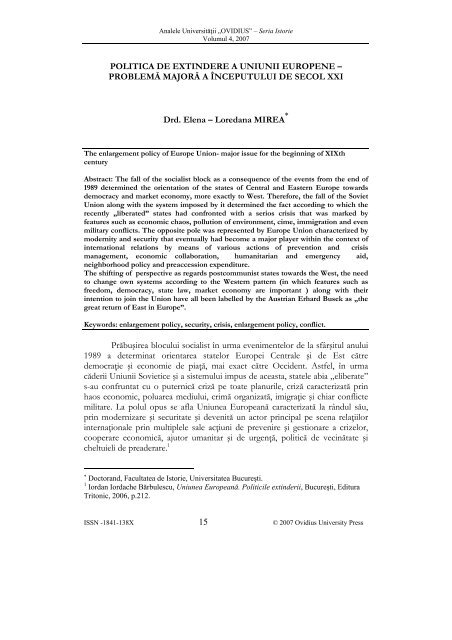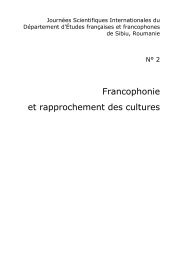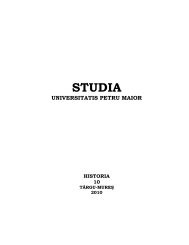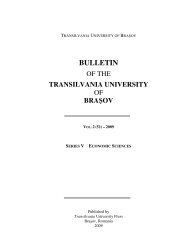„ovidius†constanţa - Biblioteca Universitatii "LUCIAN BLAGA" SIBIU
„ovidius†constanţa - Biblioteca Universitatii "LUCIAN BLAGA" SIBIU
„ovidius†constanţa - Biblioteca Universitatii "LUCIAN BLAGA" SIBIU
You also want an ePaper? Increase the reach of your titles
YUMPU automatically turns print PDFs into web optimized ePapers that Google loves.
Analele Universităţii „OVIDIUS” – Seria Istorie<br />
Volumul 4, 2007<br />
POLITICA DE EXTINDERE A UNIUNII EUROPENE –<br />
PROBLEMĂ MAJORĂ A ÎNCEPUTULUI DE SECOL XXI<br />
Drd. Elena – Loredana MIREA �<br />
The enlargement policy of Europe Union- major issue for the beginning of XIXth<br />
century<br />
Abstract: The fall of the socialist block as a consequence of the events from the end of<br />
1989 determined the orientation of the states of Central and Eastern Europe towards<br />
democracy and market economy, more exactly to West. Therefore, the fall of the Soviet<br />
Union along with the system imposed by it determined the fact according to which the<br />
recently „liberated” states had confronted with a serios crisis that was marked by<br />
features such as economic chaos, pollution of environment, cime, immigration and even<br />
military conflicts. The opposite pole was represented by Europe Union characterized by<br />
modernity and security that eventually had become a major player within the context of<br />
international relations by means of various actions of prevention and crisis<br />
management, economic collaboration, humanitarian and emergency aid,<br />
neighborhood policy and preaccession expenditure.<br />
The shifting of perspective as regards postcommunist states towards the West, the need<br />
to change own systems according to the Western pattern (in which features such as<br />
freedom, democracy, state law, market economy are important ) along with their<br />
intention to join the Union have all been labelled by the Austrian Erhard Busek as „the<br />
great return of East in Europe”.<br />
Keywords: enlargement policy, security, crisis, enlargement policy, conflict.<br />
Prăbuşirea blocului socialist în urma evenimentelor de la sfârşitul anului<br />
1989 a determinat orientarea statelor Europei Centrale şi de Est către<br />
democraţie şi economie de piaţă, mai exact către Occident. Astfel, în urma<br />
căderii Uniunii Sovietice şi a sistemului impus de aceasta, statele abia „eliberate”<br />
s-au confruntat cu o puternică criză pe toate planurile, criză caracterizată prin<br />
haos economic, poluarea mediului, crimă organizată, imigraţie şi chiar conflicte<br />
militare. La polul opus se afla Uniunea Europeană caracterizată la rândul său,<br />
prin modernizare şi securitate şi devenită un actor principal pe scena relaţiilor<br />
internaţionale prin multiplele sale acţiuni de prevenire şi gestionare a crizelor,<br />
cooperare economică, ajutor umanitar şi de urgenţă, politică de vecinătate şi<br />
cheltuieli de preaderare. 1<br />
� Doctorand, Facultatea de Istorie, Universitatea Bucureşti.<br />
1 Iordan Iordache Bărbulescu, Uniunea Europeană. Politicile extinderii, Bucureşti, Editura<br />
Tritonic, 2006, p.212.<br />
ISSN -1841-138X 15 © 2007 Ovidius University Press









